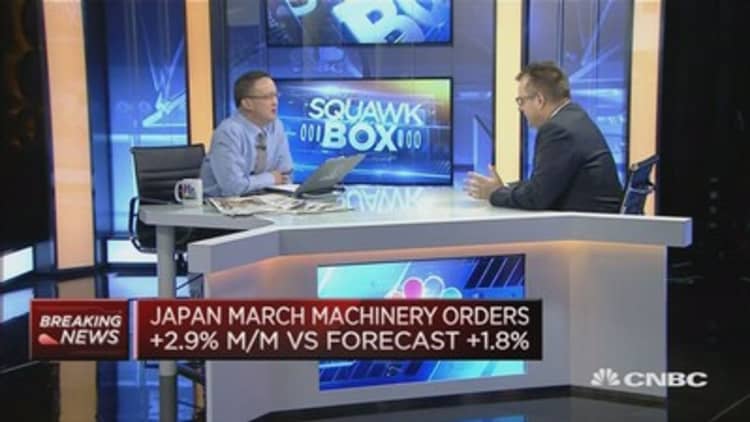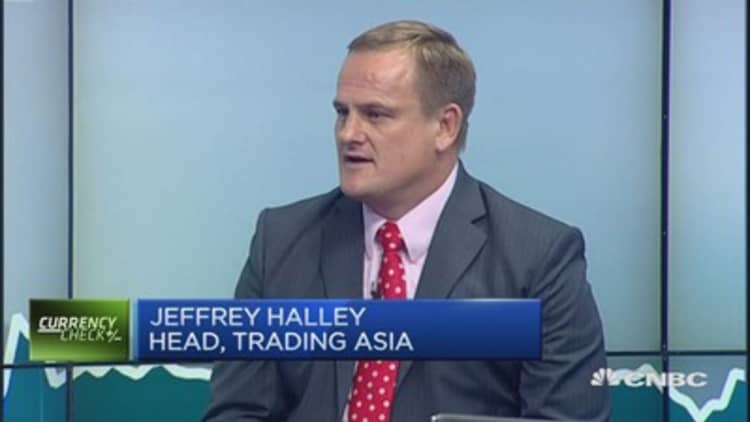A brand new trading week ushered in another mixed trading session for Asia, as investors' confidence wavered following data that showed further declines in China's house prices.
Uncertainty over Greece's financial crisis and future in the euro zone hung like a cloud over regional bourses as well, experts say. "Greece will be front and center this week as the country looks to secure a deal with its creditors while avoiding harsh austerity. The government reinforced it won't back down on its election promise to end austerity but this is likely to be a lot harder than they are leading on," Stan Shamu, IG's market strategist, wrote in a note.
The mainland's house price index fell 6.1 percent in April from the year-ago period, unchanged from March, according to Reuters calculations of Chinese official data released on Monday.
Meanwhile, machinery orders in Japan rose 2.6 percent on-year in March, rebounding from a 0.4 percent slip in February. Month-on-month basis, core orders, which are usually regarded as an indicator of capital spending in the coming six to nine months, grew 2.9 percent, better than the 1.8 percent forecast from a Reuters poll of economists.
U.S. equities finished narrowly mixed in choppy trade on Friday, with the S&P 500 eking out marginal gains to close at a record high for the second straight session amid disappointing data. The blue-chip Dow added 0.1 percent, while the Nasdaq Composite ended slightly below the flatline.
Mainland markets choppy
Worries over a slew of new share listings this week, alongside fresh data that pictured China's all-important property sector remaining in a slump, led the benchmark Shanghai Composite index down 0.6 percent to close at a one-week low.
Property counters such as China Vanke and Poly Real Estate lost 2.3 and 3.4 percent, respectively, while Gemdale closed down 1.6 percent.
Brokerage houses also came under selling pressure; China Merchants Securities led losses with a plunge of 6.5 percent, while Founder Securities and Citic Securities sagged more than 3 percent, respectively.
Aluminum Corporation of China sank 8.7 and 6 percent, respectively, in Shanghai and Hong Kong after the company said Beijing's plan to consolidate the rare earth industry involves only its parent, not the listed unit.
Meanwhile, Hong Kong shares tracked their mainland peers to fall 1 percent.
Read MoreGDP and BOJ: All eyes on Japan this week
Nikkei gains 0.8%
Japan's Nikkei 225 closed at a near three-week peak, buoyed by better-than-expected data as well as robust gains in the financial and insurance sectors.
Dai-ichi Life Insurance topped the leaderboard by surging 10.6 percent after unveiling a higher shareholder payouts.
Top lenders also outperformed the bourse after announcing plans to raise dividend payments and buy back their own shares. Mitsubishi UFJ Financial Group and Mizuho Financial Group charged up over 4 percent each, while Sumitomo Mitsui Financial Group climbed 3.5 percent.
Toshiba rebounded 1.1 percent, after falling as much as 2.5 percent at the open, following last Friday's announcement to set up a new panel to broaden its investigation into accounting irregularities.

ASX loses 1.3%
Australia's S&P ASX 200 index widened losses to finish at a near one-week low, stung by hefty losses in the banking sector as well as a 7.3 percent slump in market bellwether BHP Billiton.
The global miner was the biggest laggard for the Monday after its spin-off South 32 settled down at A$2.050. Shares in the A$11 billion ($8.81 billion) spin-off first traded at A$2.13 - the lower end of the A$2.00 to A$3.00 range forecast by analysts - when it made its debut at midday in Australia. South32 shares will also list on exchanges in the U.K. and South Africa later in the day.
Rio Tinto fell 1.1 percent, while Fortescue Metals finished flat after Prime Minister Tony Abbott backed the case for a parliamentary inquiry into the iron ore industry on Friday. The move comes on the back of plummeting iron ore prices and claims that big miners are oversupplying the market to force out smaller players.
DuluxGroup plummeted more than 5 percent after reporting a 18 percent slide in first-quarter net profit.
Meanwhile, the Australian dollar remained above the 80 U.S. cent level on Monday and analysts say the currency's appreciation back to "uncomfortable levels on a trade-weighted basis is a concern" for markets.
Kospi adds 0.3%
South Korea's Kospi index closed up modestly, after hovering in the neutral territory for most of the trading session.
Declines among blue-chips weighed on the bourse; the top two weighted stocks Samsung Electronics and Hyundai Motor dropped 0.5 and 0.6 percent, respectively, while steelmaker KB Financial Group finished 0.9 percent lower.
However, Kolon Corporation helped to offset losses by jumping by the daily maximum allowable of 15 percent, while retailing giant Shinsegae extended last week's blistering rally to surge 5.1 percent.
LG Chem also advanced 0.9 percent, following news that it has signed a deal with China's Great Wall Motor to supply batteries for the automaker's new range of electric vehicles set to be launched in 2017.

Southeast Asia
Thailand's benchmark SET index settled down 0.12 percent after gross domestic product (GDP) released earlier in the session showed Thailand's economy grew 0.3 percent in the first quarter, better than expectations for a 0.6 percent contraction. However, the modest expansion suggests that the country is still stumbling one year after the military staged a coup in May last year.
Meanwhile, Singapore's Straits Times index shed 0.1 percent despite a 2.2 percent year-on-year rise in non-oil domestic exports (NODX) for the month of April.

